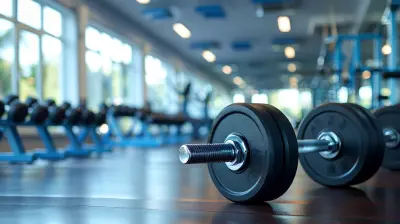The Impact of Positive Self-Talk on Athletic Performance
30 August 2025
Ever watched an elite athlete in the final moments of a game—the scoreboard neck-and-neck, fatigue setting in, and then boom! They pull off something spectacular. What fuels that clutch moment? Often, it's not just raw talent or rigorous training. It’s what’s going on inside their head. Yep, we’re talking about positive self-talk.
If you’re an athlete, coach, or even a weekend warrior, listen up. How you talk to yourself can make or break your performance. Let’s dive into the science, stories, and strategies that prove that your inner voice might just be your secret weapon.
What Is Positive Self-Talk?
Before we get into the nitty-gritty, let’s clarify what positive self-talk really means. It’s that internal dialogue you have with yourself—the voice that narrates your experiences. But positive self-talk isn’t just about being your own cheerleader. It’s purposeful, constructive, and confidence-building.Imagine your brain like a locker room. You can either scream at yourself for missing a shot, or you can say, “Shake it off, next one’s yours.” Which one is more likely to help you get back in the game?
Why Does This Inner Dialogue Matter?
You’ve probably heard the phrase, “The body achieves what the mind believes.” That’s not just motivational fluff—there’s science to back it up.1. Boosts Confidence
Confidence is king in sports. Think about it—when you believe you can do it, you probably will. Positive self-talk reinforces that belief system. Phrases like "I've done this before" or "I'm ready for this" help rewire the brain to feel capable and focused under pressure.2. Reduces Performance Anxiety
Pre-game jitters? Totally normal. But when nerves spiral into negative thoughts, your game can suffer. Positive self-talk acts like a mental anchor. Instead of getting swept up in “What if I fail?”, it brings you back to “I've practiced for this.”3. Enhances Focus and Motivation
Let’s be real: even athletes have lazy days. Positive self-talk helps you push through the slump. Reminding yourself of your goals or past wins can reignite your purpose and help you stay dialed in.
How Does Positive Self-Talk Affect the Brain?
This is where things get fascinating. Positive self-talk taps into what psychologists call cognitive restructuring. In simpler terms, it helps you swap unhelpful thoughts for more constructive ones.Every time you tell yourself, “I’ve got this,” you’re not just throwing out a feel-good phrase—you’re literally reinforcing neural pathways that increase performance, resilience, and emotional control.
It also reduces cortisol, the stress hormone that's notorious for clouding judgment and slowing reaction time. So yes, telling yourself “Keep calm, stay sharp” isn’t just a pep talk—it’s a performance-enhancing technique.
Real Athletes, Real Results
This isn’t just theory. Some of the biggest names in sports have credited positive self-talk with changing their careers.- Serena Williams often speaks about how she talks herself through tough matches, reminding herself of her strength and ability.
- Michael Jordan wasn’t just born confident—he cultivated that mental toughness through relentless practice and inner dialogue.
- Cristiano Ronaldo uses visualization and affirmation, mentally repeating phrases like “I am the best” to set the tone before big games.
If it works for the GOATs, why not for you?
Types of Positive Self-Talk That Work
Let’s break down some actionable types of self-talk you can start using today.1. Motivational Self-Talk
This is your internal hype squad. Use it to rev up your energy, especially before a game or big play.- “Let’s go!”
- “I’ve trained for this.”
- “Time to give it 110%.”
2. Instructional Self-Talk
This is especially helpful during training or when trying to learn a new skill.- “Keep your elbows in.”
- “Watch the ball.”
- “Breathe deeply; stay loose.”
3. Reinforcing Self-Talk
Used after a play or moment—good or bad. It's all about building momentum or bouncing back.- “Nice shot—do it again.”
- “That’s okay, next point is mine.”
- “Shake it off. Refocus.”
How to Build a Positive Self-Talk Habit
Changing how you talk to yourself doesn’t happen overnight. But like anything else in sports, it takes reps. Here’s how to get started:Step 1: Become Aware
Start listening to your inner dialogue. Are you your biggest critic or your number one fan?Step 2: Challenge Negative Thoughts
If you catch yourself thinking, “I suck at this,” stop. Ask yourself—“Is that true, or am I just frustrated?”Step 3: Replace With Positive Alternatives
Instead of “I can’t,” say “I’m still learning.” Instead of “I always mess up,” try “I’m getting better every time.”Step 4: Use Triggers
Set reminders on your gear, write phrases on your wrist tape, or say them aloud before drills. Make it a part of your routine.Mistakes to Avoid with Self-Talk
Okay, not all self-talk is created equal. Here are a few traps to dodge:1. Being Vague
“Be better” doesn’t cut it. Be specific: “Stay low on defense” gives your brain a clear directive.2. Overdoing It
Too much rah-rah can feel fake. Keep your talk authentic and relevant to the moment.3. Ignoring Emotions
You’re human. Negative thoughts pop up. Don’t squash them—acknowledge them, then refocus.Positive Self-Talk vs. Toxic Positivity
Let’s make one thing clear: positive self-talk isn’t about pretending everything is perfect. It’s about resilience, not denial.You’re not pretending that mistake didn’t happen. You’re just refusing to let it define your next move. That’s the key difference between helpful inner dialogue and fake positivity.
Real self-talk is grounded in truth and optimism. It says, “Yeah, that was tough, but I’ve come back from worse.”
How Coaches Can Foster Positive Self-Talk in Athletes
If you're a coach or trainer, you’ve got huge influence here.- Model it: Talk to your athletes the way you want them to talk to themselves.
- Encourage affirmations: Create team mantras or slogans that boost team spirit.
- Create a safe space: Help athletes feel okay to admit when they're struggling mentally. Then, guide them to reframe.
When positive self-talk becomes part of team culture, everyone benefits.
The Long-Term Impact
Here’s the real kicker: positive self-talk doesn’t just help with winning games. It builds character, resilience, and self-esteem that extend beyond the field.Athletes who master their internal narrative are often better leaders, better teammates, and better handled under pressure—in sports and in life. That voice in your head? It follows you everywhere. Train it well.
Final Thoughts
At the end of the day, your mindset can be your greatest ally or your worst enemy. The difference? That tiny voice looping in your brain during crunch time.So the next time you lace up your shoes, suit up for practice, or step onto the field, court, or track—ask yourself: What am I saying to myself? Make sure it’s something that lifts you up, fuels your fire, and keeps you chasing greatness.
Because guess what? You’ve got this.
all images in this post were generated using AI tools
Category:
Sports PsychologyAuthor:

Preston Wilkins
Discussion
rate this article
1 comments
Virginia Malone
Positive self-talk can significantly enhance athletic performance by boosting confidence, focusing thoughts, and reducing anxiety. Athletes should incorporate affirmations and motivational phrases into their routines to improve mindset and, ultimately, their overall performance in competitions.
September 10, 2025 at 11:54 AM

Preston Wilkins
Thank you for your insightful comment! I completely agree that positive self-talk is crucial for athletes, as it not only boosts confidence but also enhances focus and reduces anxiety, ultimately leading to improved performance.


